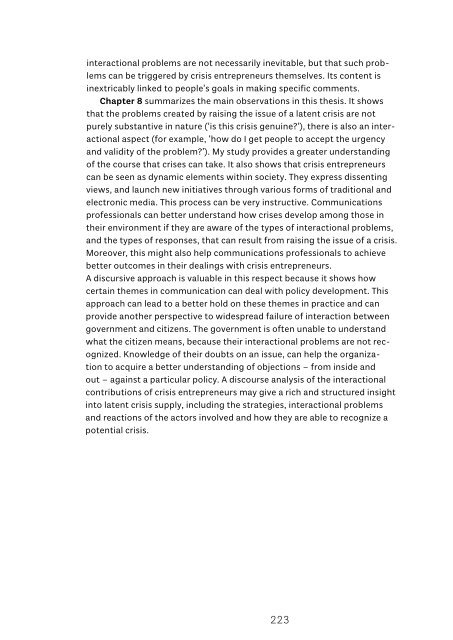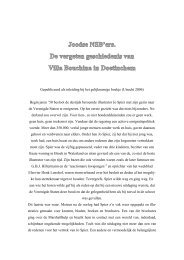Proefschrift Crisis in aantocht! - Onderzoek - Hogeschool Utrecht
Proefschrift Crisis in aantocht! - Onderzoek - Hogeschool Utrecht
Proefschrift Crisis in aantocht! - Onderzoek - Hogeschool Utrecht
You also want an ePaper? Increase the reach of your titles
YUMPU automatically turns print PDFs into web optimized ePapers that Google loves.
<strong>in</strong>teractional problems are not necessarily <strong>in</strong>evitable, but that such problems<br />
can be triggered by crisis entrepreneurs themselves. Its content is<br />
<strong>in</strong>extricably l<strong>in</strong>ked to people’s goals <strong>in</strong> mak<strong>in</strong>g specific comments.<br />
Chapter 8 summarizes the ma<strong>in</strong> observations <strong>in</strong> this thesis. It shows<br />
that the problems created by rais<strong>in</strong>g the issue of a latent crisis are not<br />
purely substantive <strong>in</strong> nature (‘is this crisis genu<strong>in</strong>e?’), there is also an <strong>in</strong>teractional<br />
aspect (for example, ‘how do I get people to accept the urgency<br />
and validity of the problem?’). My study provides a greater understand<strong>in</strong>g<br />
of the course that crises can take. It also shows that crisis entrepreneurs<br />
can be seen as dynamic elements with<strong>in</strong> society. They express dissent<strong>in</strong>g<br />
views, and launch new <strong>in</strong>itiatives through various forms of traditional and<br />
electronic media. This process can be very <strong>in</strong>structive. Communications<br />
professionals can better understand how crises develop among those <strong>in</strong><br />
their environment if they are aware of the types of <strong>in</strong>teractional problems,<br />
and the types of responses, that can result from rais<strong>in</strong>g the issue of a crisis.<br />
Moreover, this might also help communications professionals to achieve<br />
better outcomes <strong>in</strong> their deal<strong>in</strong>gs with crisis entrepreneurs.<br />
A discursive approach is valuable <strong>in</strong> this respect because it shows how<br />
certa<strong>in</strong> themes <strong>in</strong> communication can deal with policy development. This<br />
approach can lead to a better hold on these themes <strong>in</strong> practice and can<br />
provide another perspective to widespread failure of <strong>in</strong>teraction between<br />
government and citizens. The government is often unable to understand<br />
what the citizen means, because their <strong>in</strong>teractional problems are not recognized.<br />
Knowledge of their doubts on an issue, can help the organization<br />
to acquire a better understand<strong>in</strong>g of objections – from <strong>in</strong>side and<br />
out – aga<strong>in</strong>st a particular policy. A discourse analysis of the <strong>in</strong>teractional<br />
contributions of crisis entrepreneurs may give a rich and structured <strong>in</strong>sight<br />
<strong>in</strong>to latent crisis supply, <strong>in</strong>clud<strong>in</strong>g the strategies, <strong>in</strong>teractional problems<br />
and reactions of the actors <strong>in</strong>volved and how they are able to recognize a<br />
potential crisis.<br />
223







